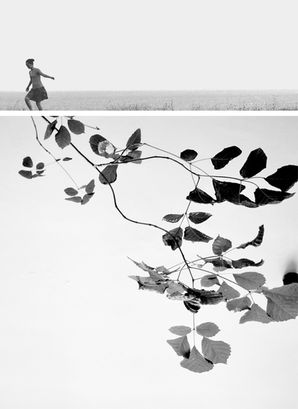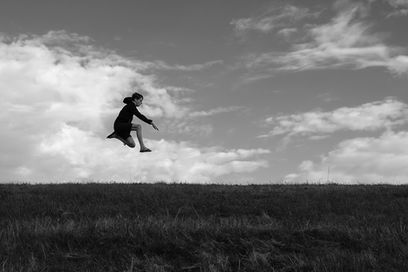
EPHEMERAL REALITY
November 11, 2020
INTERVIEW
PHOTOGRAPHY Juancho Domínguez
INTERVIEW Melanie Meggs
Juancho Domínguez is an inveterate pursuer of the ever-evolving street scene. His passion for street photography is deeply ingrained in his soul, and has only grown with time. From the hustle and bustle of the city streets to the small alleys and avenues, Juancho has captured a unique, unpublished reality that is hard to replicate. His use of black and white photography adds further drama to his body of work, while also providing a unique insight into the changing landscape of Venezuela. Juancho’s work speaks deeply to his own generation, as many of his images feature elderly people that reflect his own journey. But above all, Juancho’s photos capture the ephemeral nature of street life, emphasizing the beauty and mystery of a world in flux.

“Venezuela is a melting pot of races, and that manifests itself in my photography. Older adults appear in many of my photos, perhaps this is a projection of my own self that identifies with people of my generation. I do not remember when I was young having seen so many older people on the street. Maybe they were invisible to me and now due to my own condition they present themselves to me at every moment in different activities, but I definitely believe that now there are more elderly people on the streets of Caracas, and it may be as a consequence of the social policy that has granted old-age pensions to a greater number of people, which makes them more independent.”
IN CONVERSATION WITH JUANCHO DOMÍNGUEZ
THE PICTORIAL LIST: Juancho please tell us about yourself. When did you start getting interested in photography?
JUANCHO DOMÍNGUEZ: As I am retired, it occurred to me that to use my free time I could start taking photos, so the first thing I did was look for a compact (needless to say, I didn't know much about cameras) that I still use on some occasions. I started taking photos of objects, buildings, structures, etc., afraid of the human figure, and as I was feverish, I went out every day to photograph everything that caught my attention, and everything started to attract my attention. I was beginning to see again and see what I had not seen, what I usually saw. And so suddenly I discovered that I had a new love, like I was a teenager: photography.
I did not know the force with which it is capable of catching one, becoming a simple attraction, a passion capable of absorbing all your thoughts, and of always wanting to carry a camera with me so that, in this way, I can testify afterwards what my eyes are discovering, with the charm of an inquisitive look that surprisingly wakes up.
I am lucky to be friends with the photographers and teachers Susana Arwas and Edgar Moreno who invited me to the classes that they teach in their workshops on composition and photographic projects. There I went through a training process while I participated in the digital magazine that they edit: Magna, Histories of the Present.
The work I do does not obey a specific photographic project because what is specific is the street itself, which is the best reflection of the pulsating reality of everyday life in a society that is undergoing a process of transformation. Venezuela is a melting pot of races, and that manifests itself in my photography. Older adults appear in many of my photos, perhaps this is a projection of my own self that identifies with people of my generation. I do not remember when I was young having seen so many older people on the street. Maybe they were invisible to me and now due to my own condition they present themselves to me at every moment in different activities, but I definitely believe that now there are more elderly people on the streets of Caracas, and it may be as a consequence of the social policy that has granted old-age pensions to a greater number of people, which makes them more independent.
Now I am happier and with a new life project; filled with photos until I complete the last quarter of an hour I have left to live. The lights and shadows follow each other in moments and change in a few minutes and the action of the people is a matter of seconds, everything has to coincide with the moment, which is not only a decisive moment but also a decided one. I do not intend anything other than to give free rein to my restless and curious eye and show the result of that passion for photography.
I am a man of few words, that's why I use photography.
TPL: Street photography can be about waiting around for that right moment. What is that right moment for you? Is there anything particular you want to express through your photography?
JD: In street photography, you don't always have to wait for the right moment, many times that moment comes as a surprise to you and you have to be reactive instantly, or you are left with the frustration of perhaps having lost the photo of the day and if so, it makes you feel bad every time you remember it. The moment is not only decisive but decided.
What type of street photographer are you?
I tend to be patient and discreet, going incognito among people, perhaps it is due to my shy nature, despite the fact that on many occasions people have said to me that I have taken a photo of them, with reactions ranging from kindness to violence.
TPL: Do you have a favourite quote or saying that resonates with you the best?
JD: A quote that I really like is this one by Julio Cortázar - "Among the many ways to combat nothingness, one of the best is to take photographs."
I like it because I am a retiree who has nothing to do.
TPL: Do you have any favourite artists or photographers you would like to share with us, and the reason for their significance?
JD: As I am fundamentally self-taught, my training has been informal and photographers have appeared on my way in a fortuitous way but I cannot forget when I met Fan Ho and the impression he made on me, by making me see photography as an artistic way to express your self and soul.
Now I am happier and with a new life project: filled with photos until I have fulfilled the last quarter of an hour I have left to live.

TPL: How does the equipment you use help you in achieving your vision in your photography? Do you have a preferred lens/focal length? Do you do much post-processing?
JD: The camera I use is very small, to go unnoticed and not attract attention. It is a Sony A5000 with a 16-50mm kit lens.
I use Capture One with fairly basic processing, because I like to post natural photos, similar to what my eyes saw when I took them.
TPL: Have you ever been involved in the artistic world before photography?
JD: Yes, before photography I was making music for some time, mainly linked to theatre.
TPL: Where is your favourite place to photograph?
JD: In the centre of the city is where I move best because it seems to me that there is more contrast both between people and in situations that are worth photographing. I also look for places where light and architecture produce interesting shadow and chiaroscuro areas.
TPL: Are there any special projects you are currently working on that you would like to let everyone know about?
JD: I had several proposals, including a book for a university, but this pandemic led them to uncertain terrain.
TPL: What are some of your goals as an artist? Where do you see yourself or hope to see yourself in five years?
JD: What would fill me most with satisfaction is to see my photos in an exhibition, to show them to the public as a coherent whole that expresses not only the face and the heartbeat of the city but my own inner world.
TPL: “If you weren't photographing what else do you think you would be doing?
JD: Dying...”

Juancho Domínguez is an exceptional street photographer who has dedicated his life to capturing the moments of everyday life in Venezuela through the lens of his camera. His work is a reflection of social change, and his mastery of black and white photography adds an extra layer of drama and contrast to his images. To get a closer look at the work of Juancho Domínguez, follow him on Instagram and witness his unique perspective on the people of Venezuela.







































